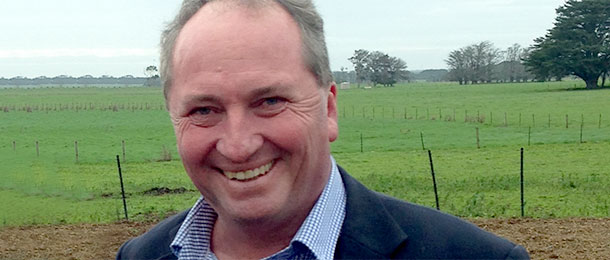Deputy Prime Minister Barnaby Joyce believes superannuation funds should engage in buying Australian property to halt the loss of local land assets to foreign residents.
“It frustrates me somewhat when we hear that the largest dairy farm in Australia, Van Diemen’s Land Company, sold the other day [to Moon Lake Investments, owned by a Chinese businessman],” Joyce told the recent 2016 SMSF Members Association Conference in Sydney.
“Let’s be honest with ourselves. Why didn’t a superannuation fund buy it?
“Why did people scream ‘nobody’s going to buy that’ but then we’re not going to buy it ourselves? That doesn’t make any sense.
“It is a good purchase and a prudent buyer has gone out and purchased it. That’s what happens.”
He said of the $2.3 trillion in super assets, only a very small percentage was tied up in the ownership of rural assets.
“Let’s see what we can do to turn that around,” he said.
“With SMSFs, you have the capacity to make wise decisions.
“Ask yourselves how you’re going to get in on it? How are you going to be part of it?”
He refused to comment on the government’s position on super tax concessions, as well as rumoured plans to cap negative gearing concessions, emphasising the government would properly undergo the Expenditure Review Committee process before making any announcements.
“You’ve got to go through a diligent process where everything is kept in the room because the deliberations never really [form] until all the strands are brought together in that final tapestry of the policy,” he said.
“So we can’t start commenting … on what we may be ruling in or ruling out because then the review process, as you can all understand, becomes completely and utterly chaotic, and without purpose.”
In response to a delegate question about whether the government paid attention to the “dulling of the economy” and other items that went through the media cycle during an election campaign, which in turn resulted in enormous damage to mum-and-dad businesses and superannuation funds, Joyce said: “The economic debate is, at times, knocked off the agenda when it should be front and centre.
“And there should be a clear line of sight between the certain policies of the alternate parties so that you can make a decision about where your nation may land.
“I think there should always be a discussion and you, the Australian people, have every right to say that you want to know exactly where the [government’s] economic program is, exactly where the economic path will lead to and make a decision upon which party you wish to back.”


